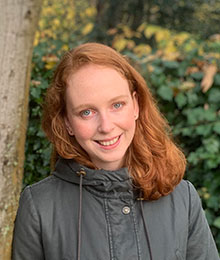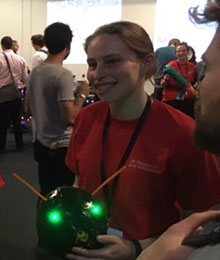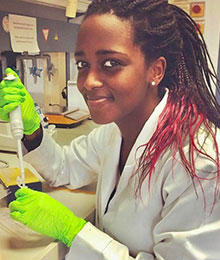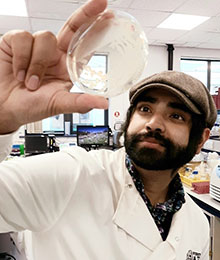‘Most promising science’ prizes at Annual Conference 2021: Microbiology winners
Posted on June 14, 2021 by Microbiology Society
Over the week at Annual Conference Online 2021, delegates showcased excellent posters and exciting research and we are very pleased to announce the winners of the Microbiology Society Journals ‘Most Promising Science’ prizes. In this blog, we will find out more about some of the winners awarded the prize by Microbiology Editors.

Anna Dewar: ‘Plasmids facilitate pathogenicity, not cooperation, in bacteria’
Who or what inspired you to be a scientist?
I watched the Royal Society’s Christmas Lectures every year as a child. I was always struck by how enthusiastic each of the scientists were about their field. The prospect that I could turn my own curiosity of the natural world into a career, like they had, was really exciting.
What are you currently working on and what area of your research excites you the most?
I’m working on the genetic basis of cooperative behaviour in bacteria. I’m most excited about using an evolutionary perspective to ask broad questions, such as where are cooperative genes located within genomes, what kinds of selection are these genes under, and how and why do they vary across species?
How would you explain your poster to a child under 10?
Bacteria, like people, have genes to control how they look and behave. Unlike people, bacteria can swap their genes with each other. We investigated if swapping genes determined whether they help each other. We found it didn’t. Instead, these genes may allow bacteria to live inside different animals and plants.
What would you be doing in your career if you weren’t a scientist?
I’d probably be either a teacher or a writer – conveniently, both are important parts of being a scientist. I’d also love to work in science policy, or in a museum with loads of cool fossils!
Elizabeth Ledger: ‘Host environment induces daptomycin tolerance in Staphylococcus aureus’

Who or what inspired you to be a scientist?
Biology was always my favourite subject at school, so I went on to study it at the University of Sheffield. My final year undergraduate research project showed me how fun research could be and I had a really supportive lab group who made me believe I could do a PhD!
What are you currently working on and what area of your research excites you the most?
Although I’m now based at Imperial College, I’ve recently been working with my undergraduate project supervisor at Sheffield to understand how bacteria build their cell walls in the host. I really enjoy working with experts in different disciplines to tackle a problem from all sides and get to grips with it.
How would you explain your poster to a child under 10?
Sometimes medicines designed to kill bacteria don’t work very well. We found that sometimes this is because when the bacteria get inside your blood, they build a really thick wall around themselves and hide behind it so that the medicines can’t reach them. Now we know this, we can design new medicines that will work better in future.
What would you be doing in your career if you weren’t a scientist?
I really enjoyed Latin and Ancient Greek at school and almost decided to study Classics at university, so perhaps I’d be working in a library or museum now instead of a lab!

Evette Hillman: ‘Metagenomic analysis of functional bile acid genes and bile acid composition in faecal samples of bile acid diarrhoea sufferers’
Who or what inspired you to be a scientist?
Ms Roberts and Professor Robert Jackson. Ms Roberts was my biology teacher at middle school and Professor Jackson was my BSc thesis supervisor. They are the reasons why I am a scientist now. This demonstrates the importance of having excellent teachers.
What are you currently working on and what area of your research excites you the most?
I am looking into faecal microbiota transplantation (FMT) as a possible treatment for bile acid diarrhoea.
How would you explain your poster to a child under 10?
There are lots of different bacteria in our tummies. These bacteria make proteins that can sometimes make us feel better but also make us ill. I am looking at these proteins in patients that have something called bile acid diarrhoea.
What would you be doing in your career if you weren’t a scientist?
Super random, an event planner. I love bringing people together to have a good time.
Jazz Ghataora: ‘Engineered hybrid MerR transcription factors enable construction of novel MerR based synthetic circuits for heavy metal detection in Bacillus subtilis’

Who or what inspired you to be a scientist?
Around when I started studying biology during my A-levels, I stumbled across a YouTube video about synthetic biology. It documented an iGEM team building genetic circuits in bacteria to detect waterborne pathogens which fascinated me greatly. For me, it cemented the inspiration to want to become a scientist.
What are you currently working on and what area of your research excites you the most?
I mostly focus on designing synthetic circuits in B. subtilis in order to detect toxic heavy metals in the environment. The most exciting area of this field is the opportunity to develop novel synthetic toolboxes to facilitate the development of much more advanced circuits with a variety of other applications.
How would you explain your poster to a child under 10?
We design bacteria so they can help us sense nasty chemicals in the environment which could make us very ill. Think of it like a light-bulb switch. If the bacteria find anything nasty, the light bulb switches on. If the bacteria don’t find anything nasty, the light bulb stays off.
What would you be doing in your career if you weren’t a scientist?
Music has always been a passion of mine from a young age, and over the years I’ve gradually learnt to play several different instruments. If I had not become a scientist, I would likely see myself travelling the world to teach music to children.
Another blog with more winners of the Microbiology ‘Most Promising Science’ prize will be published next week.

